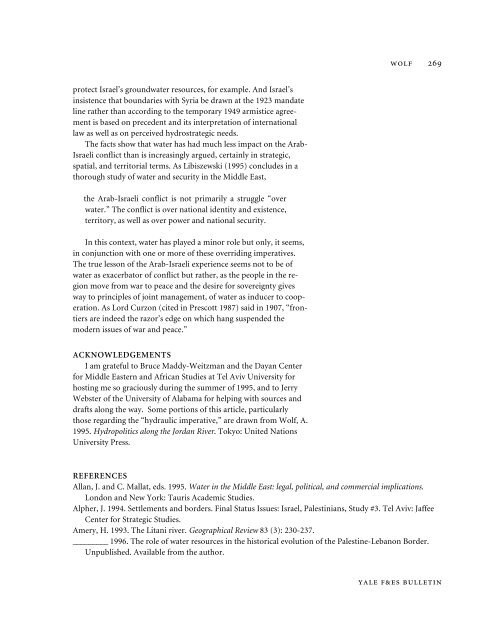Hydrostrategic Decisionmaking and the Arab ... - Yale University
Hydrostrategic Decisionmaking and the Arab ... - Yale University
Hydrostrategic Decisionmaking and the Arab ... - Yale University
You also want an ePaper? Increase the reach of your titles
YUMPU automatically turns print PDFs into web optimized ePapers that Google loves.
WOLF 269protect Israel’s groundwater resources, for example. And Israel’sinsistence that boundaries with Syria be drawn at <strong>the</strong> 1923 m<strong>and</strong>ateline ra<strong>the</strong>r than according to <strong>the</strong> temporary 1949 armistice agreementis based on precedent <strong>and</strong> its interpretation of internationallaw as well as on perceived hydrostrategic needs.The facts show that water has had much less impact on <strong>the</strong> <strong>Arab</strong>-Israeli conflict than is increasingly argued, certainly in strategic,spatial, <strong>and</strong> territorial terms. As Libiszewski (1995) concludes in athorough study of water <strong>and</strong> security in <strong>the</strong> Middle East,<strong>the</strong> <strong>Arab</strong>-Israeli conflict is not primarily a struggle “overwater.” The conflict is over national identity <strong>and</strong> existence,territory, as well as over power <strong>and</strong> national security.In this context, water has played a minor role but only, it seems,in conjunction with one or more of <strong>the</strong>se overriding imperatives.The true lesson of <strong>the</strong> <strong>Arab</strong>-Israeli experience seems not to be ofwater as exacerbator of conflict but ra<strong>the</strong>r, as <strong>the</strong> people in <strong>the</strong> regionmove from war to peace <strong>and</strong> <strong>the</strong> desire for sovereignty givesway to principles of joint management, of water as inducer to cooperation.As Lord Curzon (cited in Prescott 1987) said in 1907, “frontiersare indeed <strong>the</strong> razor’s edge on which hang suspended <strong>the</strong>modern issues of war <strong>and</strong> peace.”ACKNOWLEDGEMENTSI am grateful to Bruce Maddy-Weitzman <strong>and</strong> <strong>the</strong> Dayan Centerfor Middle Eastern <strong>and</strong> African Studies at Tel Aviv <strong>University</strong> forhosting me so graciously during <strong>the</strong> summer of 1995, <strong>and</strong> to JerryWebster of <strong>the</strong> <strong>University</strong> of Alabama for helping with sources <strong>and</strong>drafts along <strong>the</strong> way. Some portions of this article, particularlythose regarding <strong>the</strong> “hydraulic imperative,” are drawn from Wolf, A.1995. Hydropolitics along <strong>the</strong> Jordan River. Tokyo: United Nations<strong>University</strong> Press.REFERENCESAllan, J. <strong>and</strong> C. Mallat, eds. 1995. Water in <strong>the</strong> Middle East: legal, political, <strong>and</strong> commercial implications.London <strong>and</strong> New York: Tauris Academic Studies.Alpher, J. 1994. Settlements <strong>and</strong> borders. Final Status Issues: Israel, Palestinians, Study #3. Tel Aviv: JaffeeCenter for Strategic Studies.Amery, H. 1993. The Litani river. Geographical Review 83 (3): 230-237._________ 1996. The role of water resources in <strong>the</strong> historical evolution of <strong>the</strong> Palestine-Lebanon Border.Unpublished. Available from <strong>the</strong> author.YALE F&ES BULLETIN
















